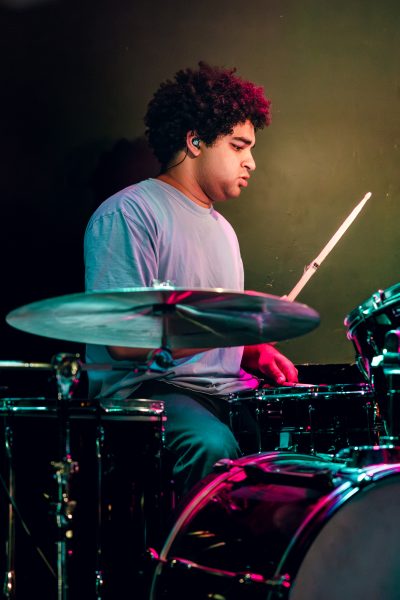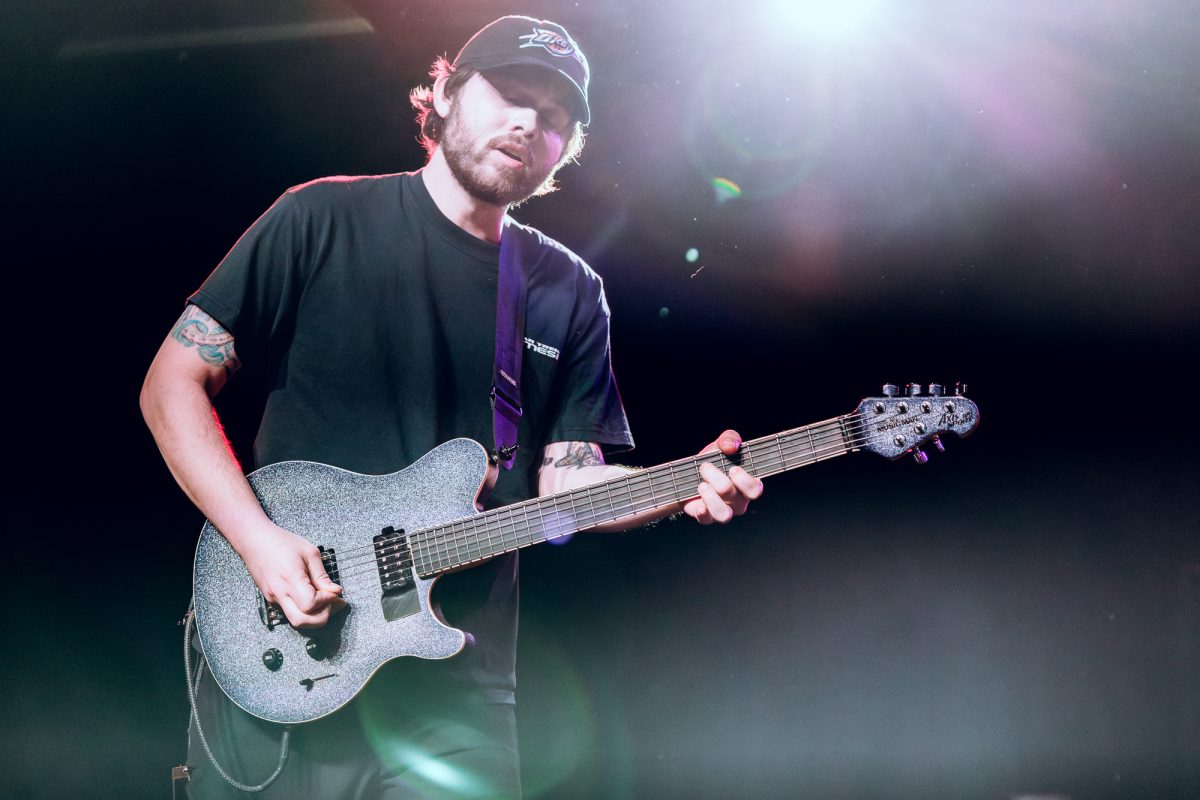From High School to the House of Blues

“I should’ve tried to save you from all of this madness,” bellows Aidan Zerbini, lead singer of San Diego electro-infused indie pop band, Winnabego, on the closing track of their first EP, before concluding with the stoic refrain, “There are no streets for people like you and me.”
Zerbini’s somber, introspective words about carving one’s own path as an artist combined with producer/multi-instrumentalist Keshaun Slevinsky’s emotional synth-and-percussion build up may seem strangely out of place for the band’s balmy, carefree hometown of Oceanside, CA. Yet the revelations hidden within Winnabego’s music point to obvious, yet understated, facts that remain true, no matter how close to the beach one lives: coming-of-age is difficult, dealing with mental health is difficult, and staying true to yourself as an artist is especially difficult.
“We really care about the person listening to our music,” Slevinsky said. “If we didn’t care about the actual connection our music can have with our fans, if we just cared about numbers, it would be super easy to get clicks and followers. But that’s not what we care about. We want people to sing along to our music when they are going through personal challenges–like mental health or breakups or trying to figure out who you are–just as we sing along to our favorite artists when we are struggling. We want to build an organic connection with listeners through the true parts of ourselves we put into our music.”
It is that shared respect for authenticity that brought Zerbini and Slevinsky together, launching a collaboration that took them from Mission Vista High School to the House of Blues.
Faint echoes of childlike laughter and slow playing of pensive keys start “Become,” the opening song on Winnabego’s first EP “There Are No Streets.”
“How can I become someone I’m supposed to?,” Zerbini croons in the first lines. “Someone that’s not me?”
Zerbini’s rhetorical questions in “Become” emphasize the impossibility of becoming a carbon copy of a different person or artist and the importance of fully developing one’s own idiosyncratic talents and interests. “Become,” then, is the EP’s coming-of-age preamble, reflective of the concerns of Zerbini and Slevinsky growing up.
“Sometimes it’s hard not to compare yourself to other bands that seem more successful than you,” Zerbini explained. “Everyone wants to quit their day job and commit to music full time and have the spotlight. But, in reality, every hard-working musician has a story and message to offer a listener. It’s not about having the perfect story and life. It’s about embracing your own story and sharing that with others.”
In humble and unglamorous fashion, Winnabego’s story started not in some cutthroat performing arts academy or stringent classical piano training but in an average high school freshman Spanish class. Zerbini and Slevinsky occasionally turned to another to clarify directions about conjugating verbs or whether to use “por” or “para” in a sentence. And the duo did not like each other much upon first encounters.
“When we first met in Spanish, I actually thought Keshaun hated me,” Zerbini recalled. “Every time I looked over at him or asked him a question he replied with the most monotone answers ever. But I kind of liked that. It showed me that he didn’t care what anyone else thought.”
But soon after their initial, unimpressive in-class interactions, Zerbini and Slevinsky both joined the Mission Vista High School steel drum band–not knowing the other had signed up. When they saw each other, surprised, at the first band meeting, they realized they had a similar passion for music.
“Meeting Keshaun through the steel drum band really launched our friendship,” Zerbini said. “We discovered we came from different musical backgrounds but liked a lot of the same music styles. I had been in musical theatre when I was a kid, and, for some reason when I started high school, I thought I was ‘too cool’ for musical theatre, so I stopped theatre and did music only instead. But, looking back, I see how wrong I was–musical theatre is amazing.”
“I grew up in a musical family,” Slevinsky siad. “My dad taught music. My sister and I used to be in a family band that played all the time. And then that morphed into me playing worship at my church for a while. When I met Aidan, it was refreshing to learn we both liked artists that brought these kinds of synth-inspired, percussion-heavy songs with genuine lyrics.”
“I think in addition to our shared interests in music, we were inspired by our music teacher. We both enrolled ourselves in multiple classes and programs led by that teacher, like the steel drum band. And that teacher really energized us to craft our sound and hone our skills. We met a bunch of other passionate musicians through it, too,” Zerbini said. “And with that encouragement from our teacher and connections we found at school, we pretty quickly formed our first band, Ferris, that I played guitar in, and we even released a song on Spotify.”
But the duo did not reserve themselves to one band in particular. They offered whatever talents they possessed or wanted to hone–singing, producing, playing guitar, playing drums, trying new genres–to any group that would have them.
“We played all over the place, not just with Ferris or the steel drum band, although I continued to take as many music composition and steel drum classes as possible,” Zerbini clarified. “Most memorable was this huge concert our high school hosted every year called Rock the Hill. I remember that we played with a funk band in October of our senior year. That was the fall before COVID put everything on pause. We decided to play covers of these well-known songs and the audience was into it. People were screaming along, the crowd was alive. We performed ‘Dean Town’ by Vulpeck, and that was fun. But the peak of it was when we played ‘Ghostbusters.’ Since it was October, it was just in time for Halloween. It was like a movie–everyone knew the words and was shouting lyrics out. Honestly, I don’t think we’ve beaten that performance. Playing Rock the Hill and other energetic shows made me realize that I wanted not just to play music–but make my own.”
Zerbini made progress toward that creative aspiration shortly after their memorable “Ghostbusters” performance–albeit catalyzed by unfortunate circumstances. Some months later during their senior year, COVID-19 shut down shows and in-person classes.
The duo were separated from members of their different projects, performances were cancelled for the remainder of the year, and Ferris, their main band, ended. Despite those setbacks, Zerbini and Slevinsky reflected on what they wanted in their future and decided to pave their own street forward.
“Our first official band, Ferris, called it quits in 2020, the spring of our senior year when covid started,” Zerbini said. “But Keshaun and I knew we wanted to keep making music. And, as a pair, we had a really natural, fluid way of communicating that wasn’t as strong in our first band. That’s when Keshaun and I started our own band, Winnabego.”
To craft their own style, the duo started as many artists do–mixing together sounds they both loved (Hippo Campus, Arlie, Dayglow, and Magic City Hippies) with lyrics relevant to problems in their own lives.
“We started out by leaning into the synthy sound we loved in high school–Hippo Campus, Dayglow, Arlie,” Zerbini said. “And then we focused on themes that were on our mind–getting through mentally challenging times, supporting the ones we care about, learning lessons from past relationships, and reflecting on what it means to be original.”
“The ‘Bambi’ album by Hippo Campus was really important to us, especially when writing the songs on ‘There Are No Streets,’” Slevinsky added. “But honestly we pull inspiration from all over when we’re writing. Half our process is just us saying, ‘Hey, check out this song!’ And it might not even be the same style as Hippo Campus or Dayglow. Like, I love Carrie Underwood and Hans Zimmer.”
After forming during 2020, Zerbini and Slevinsky slowly set to work, channeling their varied themes and influences throughout several years penning, performing, and polishing songs.
“Together we form a strong musical team, combining our unique strengths. We spent a lot of time seeing how we can use our different skills to create the different sides of the same coin and create a beautiful, shining whole,” Zerbini explained. “Keshaun is a lot better at the production side of things and how the song carries sonically. And I think I put more effort into what the lyrics and story of the song are trying to say. Both elements are what make that final beautiful product complete. We worked the last few years experimenting with how our skills overlap, combine, and complement each other. That collaboration is what has helped us develop our sound, adding different layers to it.”
Those differing layers–sound and lyrics, form and content–have helped Winnabego gradually animate their authentic personal narratives within their music in hopes that they can create something relatable and poignant like the influences that have impacted them. For instance, many of Winnabego’s songs work to make unique common coming-of-age lessons they have experienced–accepting failed young love, persevering through breakups, and overcoming the weight of gossip.
“I feel like there’s so many key moments in my life where there’s been one song or one album that has been the soundtrack that has supported me through that time or helped me think more about what I was going through,” Zerbini said. “And so we really try to make music that can be a soundtrack to a key moment in somebody else’s life by writing about what we’ve gone through. But it’s not just lyrics that people relate to, it’s how immersive the song is to them, musically and lyrically. We want to combine those elements to make something that feels true and pulls people in.”
In “Festival,” Zerbini and Slevinsky work to combine form and content to transform that cliché lesson of making peace with the ending of a youthful, romanticized relationship. The song honors their influences with a summery, beachy vibe built on twinkling chimes and energetic beats, and Zeribini’s endearing high-and-low vocals capture that naive-yet-idyllic feeling of a new relationship.
But “Festival” tries to set itself apart by not just being carefree innocence, like many pop songs. That summery sound is contrasted to self-aware lyrics and imagery that bemoan the foolish belief that young relationships can last forever.
“Drinking from that wishing well,” Zerbini laments. “I can’t see without your/Technicolor, twenty dollar,/Glasses that you gave me at the festival.”
“It’s the love goggles,” Zerbini explains. “Love can blind you in a way. ‘Festival’ is about how wearing the love goggles makes you ignore warning signs that something is not working out. Once you take off the love goggles and accept the reality of not being with someone, it can be kind of harsh on your heart. We wanted to capture the feeling of taking off those goggles, that shock and denial.”
But what if the other person in the relationship is wearing the love goggles? What does that feel like?
“Miami” tries to capture that perspective opposite to “Festival.” The song describes how it feels to endure a breakup–the empty promises, attempts to make something work before it falls apart. The song starts with a whispery, metallic percussion, like the sound of a coin swirling down a fiberglass funnel, before transitioning into a twangy guitar and bass rhythm, perhaps to represent the feeling of a relationship swirling closer and closer to the end, the plummet.
“You say you’re never gonna leave me/But I know you ain’t trying to keep me,” Zerbini croons over the tempo. “You think you’re living in a movie/But roll the credits ‘cause you’re losing…/We were in love before Miami.”
“‘Miami’ is about the other person living in a movie-version of the relationship,” Zerbini explained. “It’s like they need to complete the plot before calling it quits when it’s not working. We wanted to include different angles of growing up and going through relationships on There Are No Streets, the feelings of being the one who won’t let go and the feelings of being the one ready to end it.”
“Talking About Her,” too, shows Winnabego tackling a different type of adolescent struggle–the burden of gossip. The song starts with a pulsing disco-esque refrain, giving the mood of something light and playful. But, like the previous two tracks that have a seemingly easygoing form, their content tackles a more serious theme.
“There was a friend of ours who was going through just this really terrible time where everybody was gossiping about her,” Slevinsky said. “The whole high school knew what was going on. It was overwhelming, like there was no escape for her. With gossip it might seem funny or not a big deal to the people hearing or spreading it, but it becomes a huge mental weight for the person it’s actually about. We like this idea of using instruments and sounds to translate how something feels on multiple levels.”
Of course, pop-leaning music need not always be about love or relationships to be relatable or well-received. Mental struggle is a persistent theme in Winnabego’s music. While other tracks like “Festival” or “Miami” focus on the tension between rose-colored relationships and reality, tracks like “ping pong” and “There Are No Streets” concentrate on internal conflicts like self-doubt and depression.
Synthy strumming and a steady, bouncing beat drive the energy of “ping pong,” another deceptively buoyant-sounding track whose lyrics focus on the overpowering feeling of daily depression. The song’s repetitive bouncing beat mirrors the mundane heaviness of mental struggle, just like the eponymous ping pong ball ricocheting around but scoring no points.
“Why is it like this?/I’m terrified,” Zerbini sings with an exasperated cry on the chorus. “Everybody has their own disguise/Cycle after cycle.”
“I definitely find it therapeutic to write about topics related to struggles or mental health because it’s like taking off that perfect mask, that disguise, and being vulnerable,” Zerbini said. “I deal with that mental weight on a daily basis, and it is healing to just get it off my chest, put it onto a paper, put it into a song. Then other people can hear it, and it is validating when you see someone relate to it. Putting darkness into a song is a healing cycle, even if it is about a cycle of struggle.”
“My childhood best friend, Andres Garza, was going through a season where he felt stuck in this monotonous, neverending cycle of doing the same thing over and over again,” Slevinsky added. “We wanted to put ourselves into ‘ping pong’ but also write it for our friend. That led us to the simple back-and-forth rhythm of the song which we hoped would capture the feeling of being caught in that depression cycle of fatigue and fogginess and discouragement.”
Making one’s own path as an artist is also lined with mental struggle–a theme that returns full circle from the EP’s opener “Become.” The eponymous closer “There Are No Streets” bookends the journey, transforming the self-doubt and anxieties of pursuing a dream into fuel for the future. The song begins with a dramatic bass-heavy atmosphere like the rumbling of some giant rocket ship preparing to launch on an important mission. Zerbini mutters his vocals at the start, like he’s working up the nerve to board, and, as the song runs it escalates in intensity, his vocals growing louder and bolder.
“I’ve been trying to/Haven’t got a clue,” Zerbini worries as the song builds. “Yeah, this game is tough/Strangers everywhere/Gosh, it’s hard out there.”
“That song we definitely intended to be the closer,” Slevinsky said. “Instrumentally I was really inspired by Hans Zimmers’ ‘Man of Steel’ soundtrack. They have, like, eight drum kits playing on that and all these crazy rhythms. Originally we wanted it to be almost like a battle song with the same heavy percussion. And, I guess, it is our battle song. It’s all about how it’s difficult pursuing something out of passion. Like, from a logical standpoint, I would say doing music isn’t the best idea for me, but I love it so much that I’m willing to persevere and do it, essentially, for free. There’s always this cliché of people telling musicians ‘When are you going to get a real job?’ But, for me, I’d rather be very tight on money and doing what I love rather than working some job that I hate. It was a big deal for us to move from playing high school events like Rock the Hill to the House of Blues’ Voodoo Room. But, again, it’s about the passion the audience has for the music. We’ve played some pretty legit venues where the audience did not care. And it would make me think, ‘Well cool… I thought this was going to be the pinnacle of my career, but, instead I just miss playing house shows.’ One of my all-time favorite gigs we played was at a frat party at San Diego State University. The stage was physically falling apart, but there were just hundreds of college kids screaming out songs. That’s the kind of stuff that makes you feel how alive and fun music can be.”
As Winnabego reminds with their closing fanfare-backed anthem of determination, “there are no streets” for becoming an authentic artist. There’s passion. There’s community. There’s the risk-taking for the future.
“We are really focused on thinking about why we are putting out music,” Slevinsky concluded. “We want music to be this local community that we can celebrate and collaborate with. We are not into cutthroatness or jealousy. Of course, in a sense, we all want the spotlight. We all want to quit our day jobs and make music full-time. That is a dream of many artists. But we believe that most bands have something unique to offer for others to join in on. What matters most is that we focus on why we are putting out music in the first place. We put our heart on our sleeves, we put our heart in our songs, and we make plans for where our heart wants to take us.”

Your donation will support the student journalists of Norton Science & Language Academy. Your contribution will allow us to purchase equipment and cover our annual website hosting costs.




